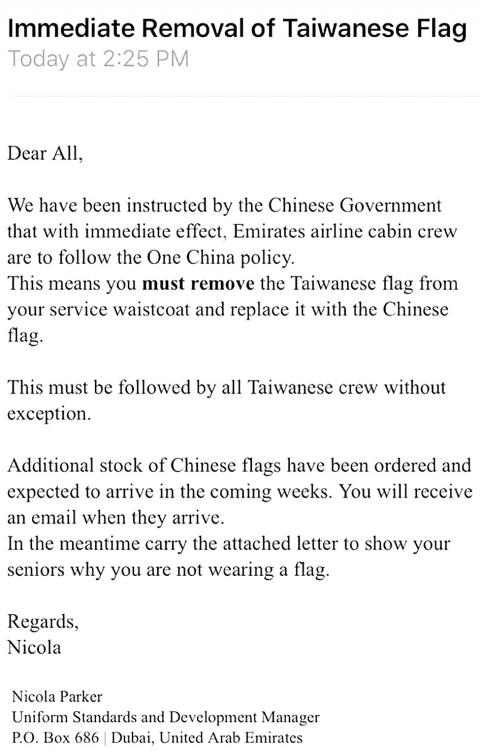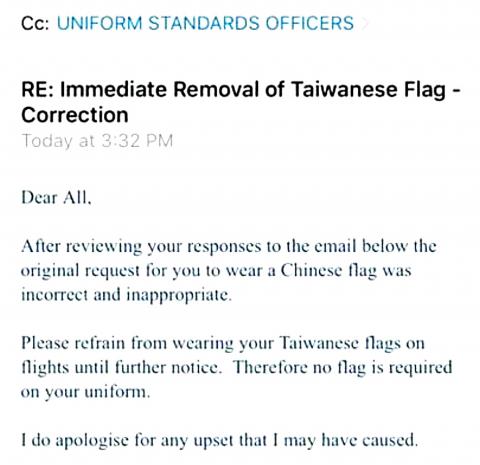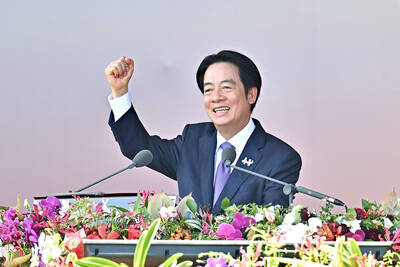Dubai-based Emirates Airline yesterday retracted a controversial directive asking Taiwanese cabin crew to remove their “Taiwanese flag pins” and replace them with Chinese flag pins in accordance with its “one China” policy.
The Ministry of Foreign Affairs said its Dubai representative office has lodged a protest with the airline, which said it gave the order under pressure from Beijing.
The Civil Aeronautics Administration (CAA) said it first expressed its concern to Emirates’ office in Taipei upon learning of the incident on Tuesday, and asked the airline’s representatives in Taiwan to come to its office yesterday morning to explain the situation.

Photo provided by a “Liberty Times” reader
“To preserve our national dignity, we have expressed our concern over this matter and stated that asking Taiwanese flight attendants to wear Chinese flag pins is extremely inappropriate. Taiwan and the United Arab Emirates have maintained good relations for many years, and people in both countries have also interacted with one another frequently. The airline should avoid enforcing measures that would hurt the feelings of Taiwanese flight attendants and Taiwanese. We have also asked the company to properly deal with this matter,” the agency said, adding that it would continue to monitor the situation.
The CAA said Emirates had promised to relay the agency’s concern to its headquarters in Dubai.
Emirates issued a statement yesterday, saying that the e-mail was “sent in error and has since been retracted.”

Photo provided by a “Liberty Times” reader
“Our intent is to recall the flag pins worn by all our cabin crew as part of our uniform update. All cabin crew are no longer required to wear a flag pin as part of their uniform. Emirates apologizes for the communication error,” it said.
The e-mail, sent on Tuesday morning by the company’s Uniform Standards and Development Manager Nicola Parker, said that the company was “instructed by the Chinese Government that with immediate effect, Emirates airline cabin crew are to follow the One China policy.”
All Taiwanese crew must follow the directive without exception, the e-mail said, adding that additional stock of Chinese flag pins have been ordered and are expected to arrive in the coming weeks.
Following multiple complaints from the company’s Taiwanese cabin crew, Parker then sent another e-mail, saying the request to wear a Chinese flag was “incorrect and inappropriate.”
“Please refrain from wearing your Taiwanese flags on flights until further notice. Therefore no flag is required on your uniform,” the e-mail said.
The company’s apology did not seem to appease Taiwanese netizens, with hundreds of them posting images or photos of Taiwan’s national flag on Emirates’ Facebook page in protest against the move.

The Ministry of the Interior (MOI) is to tighten rules for candidates running for public office, requiring them to declare that they do not hold a Chinese household registration or passport, and that they possess no other foreign citizenship. The requirement was set out in a draft amendment to the Enforcement Rules of the Public Officials Election and Recall Act (公職人員選舉罷免法 ) released by the ministry on Thursday. Under the proposal, candidates would need to make the declaration when submitting their registration forms, which would be published in the official election bulletin. The move follows the removal of several elected officials who were

FOUR DESIGNATED AREAS: Notices were issued for live-fire exercises in waters south and northwest of Penghu, northeast of Keelung and west of Kaohsiung, they said The military is planning three major annual exercises across the army, navy and air force this month, with the navy’s “Hai Chiang” (海強, “Sea Strong”) drills running from today through Thursday, the Ministry of National Defense said yesterday. The Hai Chiang exercise, which is to take place in waters surrounding Taiwan, would feature P-3C Orion maritime patrol aircraft and S-70C anti-submarine helicopters, the ministry said, adding that the drills aim to bolster the nation’s offshore defensive capabilities. China has intensified military and psychological pressure against Taiwan, repeatedly sending warplanes and vessels into areas near the nation’s air defense identification zone and across

SENATE RECOMMENDATION: The National Defense Authorization Act encourages the US secretary of defense to invite Taiwan’s navy to participate in the exercises in Hawaii The US Senate on Thursday last week passed the National Defense Authorization Act (NDAA) for Fiscal Year 2026, which strongly encourages the US secretary of defense to invite Taiwan’s naval forces to participate in the Rim of the Pacific (RIMPAC) exercise, as well as allocating military aid of US$1 billion for Taiwan. The bill, which authorizes appropriations for the military activities of the US Department of Defense, military construction and other purposes, passed with 77 votes in support and 20 against. While the NDAA authorizes about US$925 billion of defense spending, the Central News Agency yesterday reported that an aide of US

NATIONAL DAY: The ‘Taiwan Dome’ would form the centerpiece of new efforts to bolster air defense and be modeled after Israel’s ‘Iron Dome,’ sources said President William Lai (賴清德) yesterday pledged to strengthen the nation’s air defense capabilities and build a “T-Dome” system to create a safety net against growing military threats from China. “We will accelerate our building of the T-Dome, establish a rigorous air defense system in Taiwan with multi-layered defense, high-level detection and effective interception, and weave a safety net for Taiwan to protect the lives and property of citizens,” he said in his National Day address. In his keynote address marking the Republic of China’s (ROC) 114th anniversary, Lai said the lessons of World War II have taught nations worldwide “to ensure that